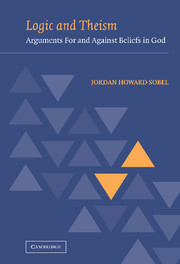Book contents
- Frontmatter
- Contents
- Preface
- DIVINITY
- ARGUMENTS FOR THE EXISTENCE OF GOD
- ON TWO PARTS OF THE COMMON CONCEPTION
- ARGUMENTS AGAINST THE EXISTENCE OF GOD
- XI Atheologies, Demonstrative and Evidential
- XII The Logical Problem of Evil
- PRACTICAL ARGUMENTS FOR AND AGAINST THEISTIC BELIEFS
- Notes
- References
- Index of Names
XI - Atheologies, Demonstrative and Evidential
Published online by Cambridge University Press: 28 July 2009
- Frontmatter
- Contents
- Preface
- DIVINITY
- ARGUMENTS FOR THE EXISTENCE OF GOD
- ON TWO PARTS OF THE COMMON CONCEPTION
- ARGUMENTS AGAINST THE EXISTENCE OF GOD
- XI Atheologies, Demonstrative and Evidential
- XII The Logical Problem of Evil
- PRACTICAL ARGUMENTS FOR AND AGAINST THEISTIC BELIEFS
- Notes
- References
- Index of Names
Summary
‘THAT THAT'S SAWCE FOR A GOOSE IS SAWCE FOR A GANDER.’
1.1. Regarding arguments against theisms, here are lines, with which, with certain reservations, I concur:
The philosophy of religion game has generally been played according to the following rules: a theist puts forth an inference from evidence to the conclusion that God exists: then, a skeptic tries to find fault with the inference or undermine the truth of the evidential claims. … [M]ost think that the burden of proof is on the theist, whereas there is no such corresponding burden on the atheist. … [But] there is no special burden of proof that the theist must bear. … [And] if one takes up the task of providing sound arguments for atheism, formidable difficulties arise. … It is much easier to punch holes in theistic arguments … than to actually argue for [the] truth [of atheism]. … [When the latter is undertaken] we find that the needs of and problems of the atheist are parallel to those of the theist. To impose the same argumentative restrictions upon the atheist is to show that the position is at least as inadequately defended as theism. … [W]hatever the reasons for its widespread acceptance, atheism is no less a matter of faith than theism. (Shalkowski 1989, pp. 1, 14)
There is no general presumption against the existence of dieties, according to which atheism follows by default in the absence of good arguments for theism. Arguments are no less, and no more, needed to rationalize atheism than to rationalize theism.
- Type
- Chapter
- Information
- Logic and TheismArguments for and against Beliefs in God, pp. 401 - 435Publisher: Cambridge University PressPrint publication year: 2003



